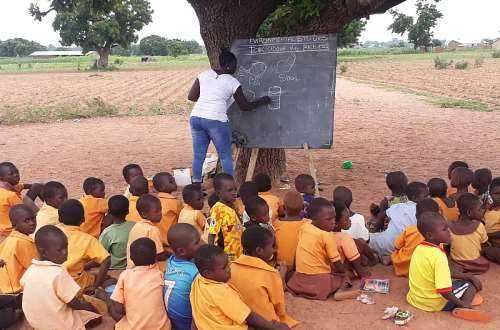Introduction
Basic education is conceptualised as a range of educational activities that help students meet their basic learning needs. It is a foundation for lifelong learning and human development.
Though basic education can take place in formal, non-formal, and informal settings, in Ghana, basic education is formal and comprises pre-school, primary classes from 1-6, and Junior High School forms 1-3, which is compulsory.
Some Current Challenges in Basic Education
Unfortunately, basic education has suffered nearly eight years of neglect under the Akufo-Addo/Bawumia NPP government, leading to a crisis characterised by:
- Dilapidated structures and a huge infrastructural deficit that has increased the number of schools under trees to over 5000;
- Inadequate, and in some cases, lack of textbooks after six years of the introduction of a new curriculum;
- Acute furniture deficit, manifested in lack of furniture for over two million pupils in basic schools;
- Irregular payment of capitation grants resulting in arrears equivalent to eight terms;
- A poor nutrition diet due to the appallingly low allocations for school feeding and government’s heavy indebtedness to caterers;
- Inadequate and, in some cases, lack of teachers, especially in rural and underserved communities;
- Erratic supply of lesson notebooks and other required supplies to teachers, compelling teachers to buy such supplies themselves, and
- Inadequate and, in some cases, lack of sanitary facilities and non-payment of water and electricity bills.
John Dramani Mahama’s Commitment and Proposals
The NDC remains committed to achieving the full objective of the Free Compulsory Universal Basic Education (FCUBE) by prioritising investments in basic education to expand access and improve quality.
In furtherance of this, John Dramani Mahama has presented an elaborate and far-reaching plan to rescue and reset Ghana’s neglected basic education.
Below are some highlights:
- Introduce the ‘Bright Beginnings Initiative’ to revive and re-purpose early childhood education for the well-being of Ghanaian children and facilitate seamless integration into continuous schooling and lifelong learning;
- Initiate a policy to integrate early childhood education into basic education, supported by appropriate infrastructure;
- Establish a Department for Early Childhood Development under the Ministry of Education with a special mandate to promote early childhood education;
- Initiate a National Edu-Care Programme (NEP) to establish early child learning facilities in workspaces to support working parents;
- Review early childhood curricula to develop a national value-based curriculum that enhances the psychomotor skills of children and equips children with basic life skills;
- Institutionalise and promote the use of first languages (L1) as the medium of teaching and learning in early years’ education and care;
- Invest in comprehensive professional development programmes for early childhood educators;
- Introduce courses in tertiary institutions to train early childhood facilitators;
- Institute the “Teacher Dabr3” Project to provide accommodation facilities for teachers within new school buildings;
- Introduce a special allowance of 20 percent of basic salary for teachers who accept postings to rural and underserved communities;
- Abolish the teacher licensure examination, scrap the NPP’s mandatory national service for teacher trainee graduates, and restore the automatic employment of newly qualified teachers;
- Launch a ‘Furniture for All Initiative’ to address the acute deficit at the basic level in partnership with the local carpentry and furniture industry;
- Significantly improve the pupil-to-textbook ratio through the provision of curriculum-based textbooks;
- Embark on an aggressive infrastructure drive to address the increasing phenomenon of schools under trees and rehabilitate dilapidated school buildings;
- Initiate a ‘SmartStart Curriculum’ for greater integration of Science, Technology, Engineering, and Mathematics (STEM), coding and Digital Literacy, and TVET into the basic education curricula;
- Increase and ensure regular payment of capitation and feeding grants;
- Promote digital literacy at the basic level by providing computer facilities installed with digitized learning materials and upgrade ICT laboratories and;
- Promote solar energy as the primary energy source for school facilities.
Conclusion
I conclude by sharing an initiative and a forum expected to impact positively on basic education in Ghana in the first 120 days of the coming John Dramani Mahama Presidency.
John Dramani Mahama will:
a) Convene a national consultative conference on EDUCATION to build consensus on needed improvements to the sector and;
b) Commence the distribution of free sanitary pads to female students in primary and secondary schools.
The above are but highlights of a synergistic and comprehensive plan to rescue and reset Ghana’s educational system, which must necessarily begin with basic education as the foundation. John Dramani Mahama has a proven track record in the area of education and can be trusted to deliver on these promises.
Dr. Clement Abas Apaak
MP/PC Builsa South, Deputy Ranking on Education Committee, and NDC Manifesto Spokesperson on Education












